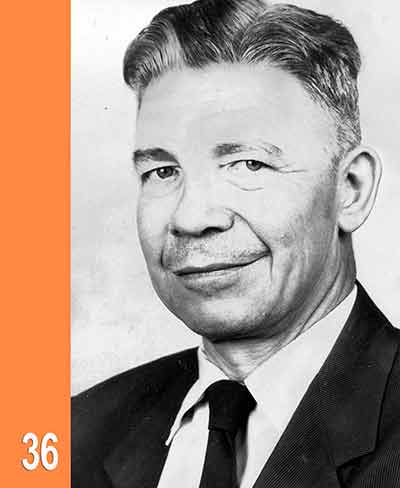Loye Wheat Miller, Sr.
Induction Year:¬Ý1979
Lived:¬Ý1899-1979
Papers:
The Evansville (In.) Press; The Cleveland (Oh.) Press
The Knoxville News; The Knoxville News-Sentinel
Loye Wheat Miller Sr. rose to prominence in Tennessee newspaper journalism by co-founding the Knoxville News, which became the Knoxville News-Sentinel, serving in the paper's management for 45 years and forging a career devoted to civic journalism.
In addition to 45 years of service for the Knoxville News and the Knoxville News-Sentinel, Miller championed the creation of the Great Smoky Mountains National Park, galvanized civic leaders to make Knoxville a desegregated "open city" in the 1960s, spearheaded voter registration and traffic safety laws, and pushed for the legal sale and control of alcoholic beverages.
Miller was born Jan. 18, 1899, in Mount Vernon, Ill., and grew up in Evansville, Ind. When the managing editor of the Evansville Press asked the high school principal to send him his most promising graduate in 1915, the principal sent Miller to his first newspaper job. After one year as a cub reporter, Miller left to attend Indiana University. When the United States entered World War I, Miller enlisted in the Army and served for one year in a field artillery unit in Texas. Miller returned to his old reporting job at the Evansville Press and a few years later left to join the Cleveland Press.
In 1921 Scripps-McRae Newspapers (now Scripps Howard) asked Evansville Press (a Scripps-McRae paper) editor Edward J. Meeman to go to Knoxville to launch a new newspaper, the Knoxville News. Meeman enlisted Miller to help him, and in 1921 they, along with three others, founded the News.
Miller was named managing editor and served in that position for 20 years. During his tenure, he began writing a humor column called "Sunshine and Moonshine," which gained a widespread following in the local popular culture.
By accompanying officials on tours through the Smokies and writing articles in support of the park, Miller was instrumental in guiding National Park Service inspectors in their decision in 1934 to designate the Great Smoky Mountains as a national park. He later accepted an appointment to the Tennessee Great Smoky Mountains National Park Commission, on which he served from 1957 to 1976.
In 1941 Miller became editor of the Knoxville News-Sentinel and spent the next 25 years in that capacity until he retired in 1967. Under Miller's editorship, the News-Sentinel, then an afternoon paper, continued its growth and dominated the market in circulation and advertising, edging out the Knoxville Journal, a morning paper.
In 1963, when sit-in demonstrations aiming to racially integrate restaurants and hotels were being conducted across the South, Miller penned an editorial titled "Let's Make Knoxville An 'Open City,'" which provoked civic leaders the next day to organize a committee on racial integration. The editorial garnered a letter of citation from President John F. Kennedy and earned Miller a Brotherhood Award from the Knoxville Roundtable of Christians and Jews. Overshadowing these accolades, however, was the subsequent peaceful integration of public accommodations in Knoxville.
In addition to spearheading a movement for racial integration, Miller, as chairman of the Tennessee Press Association's clean elections committee, helped push Tennessee's voter registration legislation into law. Later, as chairman of the Governor's Emergency Traffic Safety Legislative Subcommittee, he persuaded the Legislature to pass the state's first speed limit. Miller also used the News-Sentinel to campaign successfully for the legalized sale of alcoholic beverages in lieu of the traditional practice of bootlegging and country-club-only open bar service.
Miller died on Nov. 30, 1979, leaving behind a lifetime of service to both the News-Sentinel and the city of Knoxville.
